- Home
- Karen Traviss
Ally Page 2
Ally Read online
Page 2
Lindsay was now as translucent as the bezeri, and amphibious with it. C’naatat tackled each host as a new project to be transformed; it never behaved quite the same way twice. They were hunting a glass ghost.
Something sparkled in Aras’s peripheral vision and he jerked round. But there was nothing.
Ade suddenly raised the rifle, slow and steady. He indicated with an exaggerated nod to his right and tracked his scope. Rushes, he mouthed.
The sunlight caught something in Aras’s peripheral vision again and he wheeled round. It seemed to be bobbing up from cover and dropping back again, too big to be a sheven, but it left the same visual impression. He paused. Then he began paddling with long, slow strokes to ease the skiff clear of the bank. Ade said nothing and adjusted his aim. The rifle whirred faintly as it auto-targeted.
A glistening translucent curve flashed and fell.
There was no splash. Whatever it was had fallen on dry land.
Lindsay Neville.
Ade was on one knee, finger curled against the trigger. Aras drew the paddle through the water and then he saw it for a moment: a liquid curve above the grasses, not quite completely transparent, but still far from human. Mohan Rayat insisted that Lindsay was still in bipedal human form.
“Hold fire,” said Aras, just a breath of a whisper. “It’s not her.”
Ade held his aim, froze for a second, and then swung the rifle left as if he was targeting again. Aras stared as a glimpse of a formless, gelatinous shape slipped into the water, leaving an impression of sparkling lights and opalescence.
Ade lowered the weapon and his shoulders sagged. “What the hell was that?”
It wasn’t anything like a streamlined humanoid. And it could produce light. Sheven didn’t have bioluminescence.
But the bezeri did.
“It’s a whole new problem,” said Aras.
Yes, it was.
The Temporary City, Bezer’ej: Eqbas Vorhi base
“You shove that probe any further, sunshine, and you’re going to be using it for a suppository.”
Shan stared at Da Shapakti with as much malevolent dignity as she could muster with her legs spread apart.
“My apologies,” said the biologist. The fact that he wasn’t human and had no preconceived ideas about women didn’t make it any easier for her. It was definitely a scene for the dingbat abduction conspiracists’ album. “Unfamiliar anatomy.”
“I’ll bet.” It was years since Shan had undergone a manual examination: even her don’t-interfere-with-nature Pagan parents thought a scan was perfectly acceptable. “Haven’t you got an ultrasound probe? Jesus, even I’ve got one in my swiss, and that’s an antique.”
“Ultrasound, as you call it, provides no cells.” The Eqbas biologist brushed the probe over the surface of a sheet of gel. “I want to know how your uterus regenerates.”
“Okay, give me the probe. I know the layout better than you.” It looked like a glass cocktail stirrer. Eqbas technology was largely transparent and baffling, but Shan didn’t need to understand it to insert it. And at least it was warm. “I check myself every day now. No uterus. It hasn’t come back.”
“I’ve made you angry,” said Shapakti. He froze in mid-examination, the classic alarm reaction in wess’har. “Did you have to shout at people when you were a police officer?”
Shan gritted her teeth. Wess’har—whether they were the local population on Wess’ej or their newly arrived Eqbas cousins—had the bizarre knack of being both childishly open and uncompromisingly menacing. She’d been too harsh on Shapakti, the poor bugger. Like her, he was just a long way from home, making the best of a bad job.
No. I am home. This is where Aras has to stay; this is where Ade wants to be. I’ve got new priorities now.
“I did a lot worse than shout, believe me,” she said. Shapakti seemed to cope with her occasionally pidgin mix of English and eqbas’u. “Sorry. I’m angry that Lindsay and Rayat are walking round alive when they nearly wiped out the bezeri. At least we’ve got that bastard even if we haven’t found her.”
“You want to kill him.”
“They’ll do for starters.”
“Even though you now know the bezeri slaughtered another race in the past?”
“Would that make a difference to you?”
“No. It was many generations ago. It wasn’t this one.”
“Okay, I admit I’ve got a lot less sympathy for them now.” It’s nothing to do with sympathy. You think you’ve been conned. You don’t like anyone pulling a fast one on you. “But I’m still a copper. If I stand back and look at the evidence, Rayat and Lin are guilty. End of story.”
“Motive matters to you.”
“Intent is a large part of human law.”
“What will you do if you catch Lindsay Neville?”
It was a good simple question. Shapakti had a talent for those, just like Ade. “I ought to nip the problem in the bud and kill her too.”
Shan tried to think of some outcome that made sense beyond wanting to smash Rayat’s smirking face. Lindsay’s solution seemed clearer cut: Lin wasn’t going to hand over c’naatat any faster than Shan would, but Shan wanted to be certain. Fragmentation. If the risk would be around forever, it was the only answer.
“Rayat has asked for asylum,” said Shapakti.
“Wess’har don’t do fancy legal stuff like asylum.”
“If I can remove c’naatat from him, then you would have no need to hunt down and destroy other c’naatat hosts. Then the condition could be managed if it got into a wider human population.”
Shan didn’t like the sound of managed. She wanted to hear eradicated, and also wanted not to be part of that eradication, because she almost liked her life now. “How long am I going to lay here like a Drury Lane whore, Shap?” She held out her hand, palm up, imperious. “Give me the bloody probe and I’ll do it.”
Shapakti hadn’t seen a human in this kind of detail before. He certainly hadn’t examined one with c’naatat, and he was fully suited against the risk of contamination. Sensible precaution: but Shan still felt like a leper, and an embarrassed one at that. She extracted the glass wand and held it by its midsection so that he could take the clean end in gloved fingers.
“You can’t remove it from wess’har, you can’t remove it from ussissi, and it looks like the thing’s learned how to stop you removing it from humans,” she said. Don’t get me back in that loop of wondering why I don’t have another go at killing myself, if it’s that dangerous. “So I think I’ll hang on to a high-yield grenade until further notice, if that’s okay by you.”
Esganikan Gai regarded Rayat as her prisoner to process, and processing prisoners only had one definition for wess’har—execution. Shan didn’t have a problem with that, not for Rayat anyway. She recognized single-minded obsession with mission objectives when she saw it. It was like looking in a mirror.
You bastard.
She had to be clear why she was doing this. She tried to separate the logical necessity from just hating him for nebulous, meaningless things like needing to best him or letting his resilience goad her.
“Is this it?” Shapakti consulted the data in his virin, tilting the hand-sized slab of translucent composite to see the data. Shan swung her legs over the edge of the makeshift examination table and pulled on her underpants before peering over his shoulder. He was looking at a cutaway image of a female human that had come from the Constantine colony’s simple library. “Here? In the pelvis?”
“That’s the thing,” she said, trying to be patiently helpful. “About the size of a fist.”
“You’re certain it was removed before?”
“I reckon so. The doc made a big fuss about it. They don’t usually resort to surgery, but I refused gene therapy.”
“Why?”
“I was brought up Pagan. My family wouldn’t allow anything to alter my genome.”
“And now you have a very altered genome indeed.”
“Don’t rub it in.
”
“And you’re sure you removed the uterus when it re-grew?”
Shan detached from a memory that felt like disembowelment. She could hardly believe what she’d done: she’d heard all the horror stories of how trapped people had cut through their own limbs, and now she knew there was a level of desperation you reached—like the one she’d reached floating suitless in the void—where the survival reflex took over totally and pain didn’t matter.
“Yes, I’m certain,” she said.
“Did it hurt?”
“I cut through my abdominal wall without anesthesia. Of course it bloody well hurt.” She stared at him, waiting for a lecture on abortion. She didn’t need one. It had upended her more than she ever thought possible. “It was the only way to guarantee getting past c’naatat’s defenses.”
“I understand why you wanted to spare the child the life you have,” he said kindly. “Just as Vijissi was unable to bear the isolation.”
Thanks. Remind me he killed himself. You could always rely on wess’har to cut the crap and plow straight through the euphemism. They didn’t understand oblique language. “It still shocks you, I know.”
“We have no unwanted offspring.” Shapakti smoothed his gel gloves over his hands. It made them look wet, and with his multi-jointed thin fingers, the effect was one of a sea creature stranded on the shore. “But then we have no offspring who would bear your burden, either.”
“You have a great bedside manner,” said Shan.
“It’s hard to tell how upset you are because you suppress your scent.”
“Just as well I can.” C’naatat, forever tinkering with its collection of DNA fragments from other creatures it had passed through, had given her a wess’har scent signaling system. She kept her jask, her matriarchal dominance pheromone, well under conscious control. “I don’t want to lose my temper and end up deposing Esganikan.”
“This child was Ade’s.”
She took it as a rebuke for carelessness. “We’d both been sterilized and we thought it was okay to copulate. C’naatat had other ideas.”
“You think it has ideas? That it’s sentient?”
“Just a figure of speech. Bacteria try to survive and reproduce. But, yes, it does seem to learn and react to its hosts’ anxieties.” Shan stepped on thin ice of her own making: she’d taken the wess’har view of life and sentience to heart. Humans had no special rights or position in creation. “But I don’t like thinking of it as something making decisions for me. Nobody does that.”
Shapakti tilted his head on one side in that appealingly canine wess’har gesture of intense interest. Eqbas wess’har and their Wess’ej cousins might have looked different, but they both had those four-lobed pupils that made them cock their heads to get a better focus.
“This is very much a gethes’ habit, this need to lock yourself away in your own head,” he said. Gethes: carrion-eaters. Human eating habits appalled wess’har. “Their thoughts are still within you.”
“You ought to think of me more as a human with a few bolt-on extras.” Shan flexed her hands and bioluminescence danced as violet and amber lights in her fingers. She still didn’t know where those bezeri genes had come from. “So, no uterus. But I don’t know when it’s going to make a comeback, and…well…it’s affecting Ade.”
“You have no oursan now.”
“Yes. No sex. Not proper sex, anyway.”
“Is that because you fear conception, or because he shuns you for killing his child?”
Eqbas were wess’har, all right. However used she was to that brusque manner, the words still stung; she occupied herself fastening her belt and fidgeting with her handgun while she swallowed a retort.
No, I don’t have a smart answer. I’m just hurt.
Shapakti held both hands over a shallow metal bowl and shook them as if he was performing a conjuring trick, and in a way he was: his gel gloves slid from his spidery hands and coalesced into a pool of liquid. A thought crossed her mind, one that diverted her productively from her guilt.
“One size fits all,” she said, indicating the gloves with a jerk of her thumb. “You’re good at making reactive liquid materials. That’s the same tech you use for your ship’s hull, isn’t it?”
Shapakti did his baffled Labrador act. “Barrier and containment, yes.”
There was no delicate way to put it, but wess’har had no taboos about sex anyway. “If you can make gloves, you can make condoms.” She didn’t expect him to know the English word. “That’s a covering you put over the oursan’te—to contain seminal fluid.”
Shapakti trilled happily. “I understand.” He held up the virin. “I have all human medical data here. Only one organ for both sanil and oursan’te.”
“Think of us as the economy model.”
“I can make this device.”
“Can I try the gloves?”
He took another bowl from the neat slatted shelves of his temporary surgery and held it in front of her. A biologist—a genetic engineer—playing doctor didn’t trouble her quite as much as it had a few months ago; it made sense. He knew how to build the engine as well as repair it.
“Immerse your hands,” he said.
Shan sank her fingers into a clear gel that felt like liquid on contact and crept up her hands to her wrists. Its inexorable progress over her skin made her jerk back, and judging by the wet sheen it had stopped about halfway up her forearms. It wasn’t an unpleasant sensation; it just felt uncontrollable, as if it had a life of its own. She’d had her fill of that kind of thing with c’naatat.
“How does it know how to do that?”
“You withdrew your hands.”
“Fascinating.”
“It’s an effective barrier.”
Shan thought of the sheven, a carnivorous plastic bag, one huge enveloping gut and not much else. “If I hadn’t pulled my hands out, would it have covered my whole body?”
“Yes.”
“Jesus.”
“It’s safe, if uncomfortable. A complete barrier. You would still breathe, of course.” Shapakti made another little trill in his throat. In a Wess’ej wess’har it was excited amusement. “But you don’t need to breathe. You survived in space without a suit for many months.”
She stared at the gloves, a slick glaze as thin as skin, and rubbed her fingertips together. They simply felt wet. There was no loss of sensation. It was another wess’har gizmo that would have made a fortune on Earth if they had any desire for commerce—which they didn’t.
Condom. The gel was almost yelling it at her, and, God, how she wanted to fuck Ade properly again. So is that all you care about? You’re no better than Lin.
She tried to imagine how she’d sell the idea to Ade. “No thanks. I got used to breathing again. I think I’d miss it. How do you clean these things after use?”
Shapakti made the shaking gesture with both hands. “The coating will release itself.”
Shan suppressed a mental image of Ade separating himself from the sticky embrace of the gel. It was just as well he had a uniform-black sense of humor. “And the contaminant?”
“How dangerous is it?”
“Just body fluids. It’s not like it’s going to make us any more c’naatat than we already are.”
“Rinse the gel in water.”
“Is that it? Nearly a million years ahead of us, and you just rinse?”
“The best solution is the simplest one.”
“Yes, I do hanker for a napped flint and a pointy stick some days.”
“But how will you exchange memories now, if you put a barrier between the oursan membranes?”
“We don’t need to. It might be a useful trait for an isenj, but it’s a pain in the arse for the rest of us.” Shan shook the glove coating into the bowl with a flick of her hands that made her wrist joints crack, and watched the liquid become a gel that huddled in an oblate sphere like mercury at the bottom of the bowl. “And normal wess’har don’t swap memories either. It’s not mandatory in a rela
tionship.”
Shan made a mental note to carry on checking herself for signs of regenerated body parts anyway, condom or not. She was a copper. She didn’t put trust in what she couldn’t break into components, analyze and understand. This gel’s technology was as far beyond her as the Eqbas’s liquid spaceships, and she didn’t do blind faith.
Locked in a small room down the passage of this underground base—hidden out of respect for the wilderness round it, not for security or concealment—Rayat was another element in her life that she couldn’t trust, although she understood him far too well. She still wasn’t sure which government department he really worked for; but he was a spook, and that was all she needed to know.
She was damned if he was heading back home with his prize. C’naatat wasn’t for sale.
“Can’t your clean-up teams trace Lindsay?” she asked.
Shapakti picked up the imaging device that Shan thought of simply as the glass tea-tray and stared into its layers like a haruspex seeking meaning in entrails. He had been annoyed—as annoyed as he could be, anyway—that he couldn’t remove c’naatat from human cells as he once had. The damn thing was learning to thwart him. He made little noises in his throat that reminded her of an otter and she wondered if he was avoiding the issue in a very un-wess’har way.
But he wasn’t. He was just preoccupied. “They’ve lost track of the bezeri. They seem to have vanished.”
Shan tipped the glob of gel into a container and put it in her pocket. “I’d better find Aras and Ade, then. It’s like having a couple of naughty little boys to look after.”
It was a joke but she meant more than half of it, because the two of them had become a double act. The housebrother bond was as powerful for Ade as it was for any wess’har, more than just the exchange of DNA between the three of them and the biochemical bonding: Ade craved comradeship, and so did Aras. Species and trillions of miles of space might have separated them, but they had a lot in common apart from her—two soldiers, expendable and expended, who dreaded loneliness.
“If you find Lindsay,” said Shapakti, “will you let me take samples from her?”

 Halo: Glasslands
Halo: Glasslands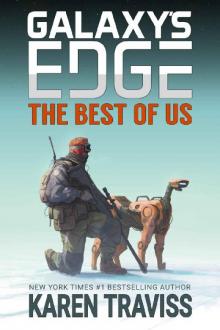 The Best of Us
The Best of Us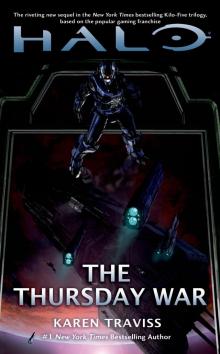 Halo: The Thursday War
Halo: The Thursday War Ally
Ally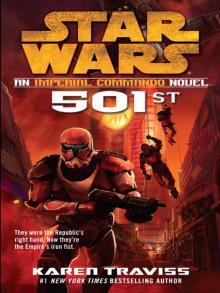 501st: An Imperial Commando Novel
501st: An Imperial Commando Novel True Colors
True Colors Matriarch
Matriarch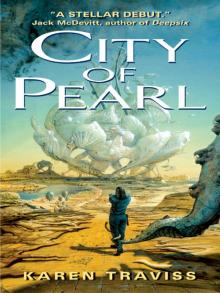 City of Pearl
City of Pearl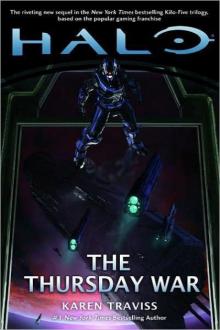 The Thursday War
The Thursday War Bloodlines
Bloodlines Gears of War: Anvil Gate
Gears of War: Anvil Gate Crossing the Line
Crossing the Line Star Wars - The Clone Wars 01
Star Wars - The Clone Wars 01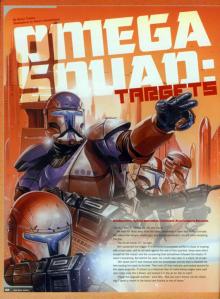 Omega Squad: Targets
Omega Squad: Targets Halo®: Mortal Dictata
Halo®: Mortal Dictata Hard Contact
Hard Contact The World Before
The World Before Order 66
Order 66 Gears of War: Jacinto's Remnant
Gears of War: Jacinto's Remnant Sacrifice
Sacrifice Triple Zero
Triple Zero Gears of War: The Slab (Gears of War 5)
Gears of War: The Slab (Gears of War 5) NEW JEDI ORDER: BOBA FETT: A PRACTICAL MAN
NEW JEDI ORDER: BOBA FETT: A PRACTICAL MAN Going Grey
Going Grey Star Wars: Boba Fett: A Practical Man
Star Wars: Boba Fett: A Practical Man Revelation
Revelation Coalition's End
Coalition's End No Prisoners
No Prisoners Star Wars Republic Commando: Hard Contact
Star Wars Republic Commando: Hard Contact Star Wars: Republic Commando: Triple Zero rc-3
Star Wars: Republic Commando: Triple Zero rc-3 The Clone Wars
The Clone Wars The Clone Wars: No Prisoners
The Clone Wars: No Prisoners Star Wars: Republic Commando: Hard Contact rc-1
Star Wars: Republic Commando: Hard Contact rc-1 Judge
Judge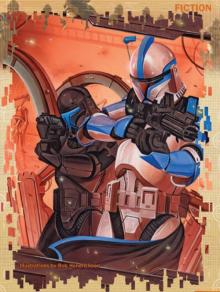 Omega Squad: Targets rc-4
Omega Squad: Targets rc-4 Star Wars - Republic Commando - Hard Contact
Star Wars - Republic Commando - Hard Contact